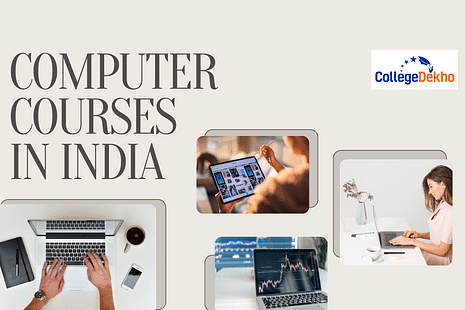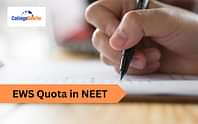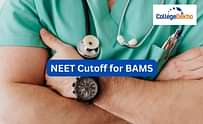- Why Choose Computer Courses?
- Basic Computer Courses List
- Computer Courses List: Duration-wise
- Six-month Computer Courses
- One-year Computer Courses
- Computer Courses Eligibility Criteria
- Computer Courses Entrance Exams
- Top 10 In-demand Computer Courses in India
- Computer Courses After 12th for Science Students
- Computer Courses After 12th for Commerce Students
- Computer Courses Admission Process
- Computer Course Syllabus
- Top Colleges for Computer Courses in India
- Career Options After Computer Courses
- Computer Courses after 12th: Higher Learning

Computer Courses in India: In the dynamic and ever-evolving world of technology, staying up-to-date with the latest advancements is no longer an option but a necessity. As the demand for skilled professionals in the digital landscape continues to surge, enrolling in Computer Courses has become a gateway to success for individuals seeking to thrive in the IT industry. In India, the rapid proliferation of technology-driven sectors has led to a growing array of computer courses, catering to diverse interests and skill levels. Whether you are a fresh graduate looking to kickstart your career or a seasoned professional seeking to upskill, computer courses in India offer a multitude of opportunities to harness the power of technology.
Also Read: BTech Course List: BTech Top Courses List
Why Choose Computer Courses?
The benefits of pursuing computer courses in India extend far beyond merely acquiring technical skills. India's prominence in the global IT arena cannot be understated. Renowned for its pool of talented IT professionals and a flourishing tech startup ecosystem, the country has emerged as a sought-after destination for computer education. By enrolling in computer courses in India, students can benefit from top-notch faculty, state-of-the-art infrastructure, and industry-relevant curricula.
Most companies rely on data and software programs since we live in a digital era. Computer Science and IT have an influence on everything, from scientific research to health care, transportation, finance, and communications. Microwave ovens, refrigerators, and door locks are now linked to our Wi-Fi networks and personal assistants. The advancement of technology has made the world a better, quicker, and more connected place. We got here owing to the bright brains of IT graduates who harnessed their love of technology to build devices and computer programs that aid us every day. Therefore, the reasons why candidates should prefer computer courses have been mentioned below:
- High Demand for Computer Experts
- Range of Specialization Available
- Continuous Learning and Growth
- Influence on Society
Basic Computer Courses List
If you're looking to embark on a journey toward digital empowerment, exploring a comprehensive basic computer course list is the perfect starting point. Enrolling in these basic computer courses will equip you with the knowledge and expertise needed to navigate the digital landscape with confidence.
- Basic Computer Literacy Course
- Microsoft Office Suite (MS Office)
- Internet and Email Basics
- Computer Typing and Keyboard Skills
- Introduction to Graphic Design
- Introduction to Programming
- Digital Marketing Fundamentals
- Computer Hardware and Software Basics
- Data Entry and Database Management
- Computer Networking Fundamentals
- Introduction to E-commerce
- Basic Cybersecurity Awareness
Computer Courses List: Duration-wise
Navigating the vast realm of computer courses can be overwhelming, especially when considering the duration of each program. Fear not, as we present a comprehensive computer course list, duration-wise, catering to diverse needs and time constraints. Explore the options and embark on your journey to success with our carefully curated computer course list!
Three-month Computer Courses
For professionals wishing to upskill or full-time workers and students looking for a quick introduction to a computer course, look no further:
Computer Course Name | Course Duration | Course Fees in INR |
|---|---|---|
Basic Computer Course | 2 months – 3 months | 1.5K – 5K |
CCC | 2 months – 3 months | 3K – 10K |
C and C++ | 2 months – 3 months | 5K – 10K |
Windows NT | 2 months – 3 months | 2K – 6K |
Visual C++ | 2 months – 3 months | 3K – 7K |
3D Studio Max | 2 months – 3 months | 1.5K – 5K |
Oracle 9i | 2 months – 3 months | 1.5K – 5K |
AutoCAD | 2 months – 3 months | 3K – 12K |
Web Page Design and Internet | 2 months – 3 months | 3.5K – 10K |
Adobe Premiere | 2 months – 3 months | 1.5K – 5K |
Financial Accounting with Tally | 2 months – 3 months | 3K – 15K |
C Programming | 1 month – 2 months | 3K – 10K |
Unix | 1 month – 2 months | 1.5K – 5K |
ASP | 1 month – 2 months | 3K – 5K |
Visual Basic | 1 month – 2 months | 1.5K – 5K |
Macromedia Flash | 1 month – 2 months | 1K – 5K |
Linux | 1 month – 3 months | 1.5K – 5K |
Adobe Photoshop | 1 month | 1.5K – 4K |
Certificate in Internet | 1 month | 1K – 3K |
Adobe Illustrator | 1 month – 2 months | 1.5K – 7K |
Tally Certificate Course | 2 months - 4 months | 8k-10k |
Six-month Computer Courses
Following is a list of computer courses that are six months long and give you a more comprehensive introduction to modern tech:
SNo | Computer Courses | Average Fees (INR) |
|---|---|---|
1. | Data Entry Operator | 5k - 6.5k |
2. | Smartphone Technician cum App tester | 7k |
3. | Hardware and Networking Courses | 50 - 60k |
4. | DIPLOMA IN COMPUTER APPLICATIONS | 5k - 30k |
5. | Digital Marketing Courses | 15k - 20k |
One-year Computer Courses
The following are some IIT computer courses that last 1-2 years.
Computer Course | Duration | Average Fees (in INR) |
|---|---|---|
COPA | 1 Year | 5k - 50k |
DTPO | 1 Year | 10k - 30k |
ICTSM | 2 Years | - |
IT | 2 Years | 20k - 50k |
DBSA | 1 Year | 1 LPA |
Software Testing | 1 Year | 50k - 5 LPA |
CAED | 1 Year | - |
CHNM | 1 Year | 1LPA - 3 LPA |
Additive Technician | 1 Year | - |
Computer Courses Eligibility Criteria
Candidates who are interested in pursuing computer science courses in India need to keep the eligibility criteria in mind. The eligibility criteria of computer science courses have been explained below:
- Eligibility Criteria for Undergraduate Computer Courses : Candidates who are willing to pursue computer science courses at the undergraduate level should pass their class 10+2 from a recognized board with a science stream securing a total of an aggregate of 55% marks in the qualifying exam.
- Eligibility Criteria for Postgraduate Computer Courses : The eligibility criteria for the postgraduate courses is that the candidates should have completed their graduation in an irrelevant course from a recognized university with at least 60% aggregate marks in the qualifying exam.
Skills Required for Computer Courses
- Check the skills required for computer courses given below.
- strong analytical and problem-solving skills
- solid foundation in mathematics, physics, and computer science
- Proficient in programming languages
- Knowledge of database management systems and computer networks.
- Good communication skills
- Teamwork
- Ability to learn and adapt to new technologies
Computer Courses Entrance Exams
Some of the popular computer course entrance examinations are mentioned below in the table:
Exam Title | |
|---|---|
BITSAT | |
Top 10 In-demand Computer Courses in India
Some of the top in-demand computer courses in India have been mentioned below along with their average salary ranges:
Computer Courses After 12th for Science Students
For science students who have just completed their 12th grade, the world of possibilities opens up with an array of computer courses in India tailored to harness their innate potential. Let's explore the diverse range of computer courses available after 12th for science students, and unlock the gateway to technological excellence and promising career prospects.
Diploma Computer Courses
Diploma courses offer a fast-track route to acquiring specialized skills and expertise, setting the stage for career advancement and personal growth. Aspirants can dive into a wide array of diploma computer courses, ranging from software development to networking, cybersecurity, and more:
S.No | Diploma Computer Courses | Duration | Eligibility |
|---|---|---|---|
1 | DCA (Diploma in Computer Applications) | 6 months- 1 year | 10+2 from a recognized board |
2 | DCP (Diploma in Computer Programming) | 1 year | 10+2 from a recognized board |
3 | Diploma in Computer Science | 3 years | 10/10+2 from a recognized board |
4 | Diploma in Computerized Accounting | 1 year | 10+2 from a recognized board |
5 | Diploma in Computer Science & Engineering (DCSE) | 3 years | 10/10+2 from a recognized board |
6 | Advanced Diploma in Computer Integrated Manufacturing (ADCIM) | 2-4 years | Completed a three-year diploma program in Mechanical/Production/Automobile/Electrical/Electronics/Computer/Civil Engineering at a recognized polytechnic or comparable institution. |
7 | Advanced Diploma in Software Development | 2 years | Possess a bachelor's degree in computer-related courses from a recognized institute |
8 | Diploma in Computerized Accounting (D.I.C.) | 1 year | 10+2 with a minimum 45% aggregate |
9 | Diploma in Computer Programming (D.C.P.) | 1 to 2-years | passing class 10 with a 45% aggregate |
10 | PGDCA (Post Graduate Diploma in Computer Applications) | 1 year | Finished graduation in any course |
11 | Post Graduate Diploma in Computer Management | 1 year | possess a bachelor's degree in computer-related courses from a recognized institute |
B.Sc in Computer Science
B.Sc in Computer Science is an undergraduate degree program offered by various universities and colleges in India. The duration of the B.Sc Computer Science program is typically three years, divided into six semesters.
Type | College Name | Total Fees |
|---|---|---|
Private | INR 2 lakh | |
INR 2-3 lakh | ||
| SRM University | INR 2 lakh | |
Kalasalingam Academy of Research and Education | INR 1 lakh | |
INR 3 lakh- INR 7 lakh | ||
Government | INR 55,000- INR 1 lakh | |
INR 23,000 | ||
INR 3 lakh | ||
INR 3 lakh | ||
INR 88,000 |
B.Tech in Computer Science and Engineering
B.Tech in Computer Science and Engineering is a highly sought-after undergraduate degree program in India.The duration of the B.Tech Computer Science and Engineering program is typically four years, divided into eight semesters.
Type | College Name | Total Fees |
|---|---|---|
Private | Vellore Institute of Technology, (VIT) Vellore | INR 5 lakh- INR 8 lakh |
SRM Institute of Science & Technology, (SRM University) Chennai | INR 10 lakh- INR 18 lakh | |
INR 5 lakh- INR 10 lakh | ||
Thapar Institute of Engineering and Technology, (Thapar University) Patiala | INR 10 lakh- INR 15 lakh | |
Birla Institute of Technology and Science, (BITS Pilani) Pilani | INR 12 lakh | |
Government | INR 8-10 lakh | |
| IIT Madras | INR 8 lakh- INR 10 lakh | |
INR 8 lakh - INR 9 LPA | ||
| IIT Kharagpur | INR 8-10 lakh | |
INR 8 lakh |
Computer Courses After 12th for Commerce Students
For commerce students completing their 12th grade, embarking on a journey toward digital excellence through specialized computer courses has become imperative. By enrolling in these carefully curated computer courses, commerce students can confidently navigate the digital landscape and unlock boundless opportunities in the ever-evolving business world.
BCA (Bachelor of Computer Applications)
This three-year undergraduate program equips students with the technical prowess and problem-solving acumen required to thrive in the IT industry.To pursue BCA in India, candidates must meet the following eligibility criteria:
- Educational Qualification: Applicants should have completed their 10+2 (or equivalent) from a recognized educational board.
- Subject Requirements: The qualifying examination should have included Mathematics as one of the main subjects.
- Minimum Marks: Candidates must meet the minimum percentage requirement, which may vary from one institution to another. Generally, students with a minimum of 50% marks in the qualifying examination are eligible to apply.
Type | College Name | Total Fees |
|---|---|---|
Private | INR 4.07 lakh | |
SICR Pune | INR 5.05 lakh | |
INR 2.94 lakh | ||
INR 2.58 lakh | ||
INR 3 lakh |
Type | College Name | Total Fees |
|---|---|---|
Government | INR 1.02 lakh | |
INR 69,500 | ||
INR 1.57 lakh |
BCA Honors
BCA Honours (BCA Hons) is an advanced undergraduate degree program that offers a specialized and comprehensive study in the field of computer applications. It is designed to provide students with a deeper understanding of computer science concepts.
Eligibility Criteria for BCA Honours:
- Educational Qualification: Candidates must have completed their 10+2 (or equivalent) from a recognized educational board.
- Subject Requirements: The qualifying examination should have included Mathematics as one of the main subjects.
- Minimum Marks: Applicants are generally required to have a minimum percentage in the qualifying examination, which may vary across institutions. Usually, a minimum of 50% marks is necessary for eligibility.
- Entrance Exams: Some universities or colleges may conduct entrance exams or interviews as part of the selection process for BCA Honours programs.
College Name | Yearly Fees |
|---|---|
SRM University | 71,700 PA |
10,600 PA | |
34,800 PA | |
58,700 PA | |
VIT | 43,000 PA |
Madhav University | 47,200 PA |
42,400 PA | |
Institute of Management Studies | 99,800 PA |
Chandigarh University | 59,000 PA |
42,000 PA |
Computer Courses Admission Process
The admission process for computer courses varies from one institute to another. Candidates are advised to check the eligibility criteria and the admission process of the institutes they are interested in before applying.
Computer Course Syllabus
The list of subjects and topics included in the Computer Course Syllabus are listed below:
- Introduction to Computers and IT
- Computer Fundamentals
- Programming Concepts and Languages
- Data Structures and Algorithms
- Operating Systems
- Database Management Systems
- Web Technologies and Web Designing
- Networking Concepts
- Software Engineering
- Object-Oriented Programming
- Cybersecurity and Ethical Hacking
- Mobile App Development
- Cloud Computing
- Artificial Intelligence and Machine Learning
- Data Science and Data Analytics
- Internet of Things (IoT)
- Project Work and Practical Training
Top Colleges for Computer Courses in India
Computer Science is one of the most in-demand courses in India and around the world. It offers a career in software engineering, hardware networking, and many other fields. Some of the institutes which are chosen by the candidates as the first choice for pursuing computer courses in India include the Indian Institute of Technology (IIT), Guwahati, Indian Institute of Technology (IIT), Hyderabad, National Institute of Technology (NIT), Trichy, Birla Institute of Technology and Science, Indian Institute of Technology (IIT), Bombay, Indian Institute of Technology (IIT), Kanpur, Indian Institute of Technology (IIT), Kharagpur, Indian Institute of Technology (IIT), Delhi, Indian Institute of Technology (IIT), Roorkee. The following are some of the best colleges that offer Computer Science courses along with the average fee of the institutes:
Career Options After Computer Courses
Whether it's software development, data analysis, cybersecurity, web designing, or artificial intelligence, computer courses equip professionals with the tools to navigate the digital landscape with confidence. Embrace the realm of endless possibilities as we delve into the myriad job opportunities awaiting skilled graduates after completing computer courses.
Computer Courses after 12th: Higher Learning
M.Tech in Computer Science
MTech in Computer Science (Master of Technology in Computer Science) is a postgraduate degree program that caters to individuals aspiring to deepen their knowledge and expertise in the field of computer science and technology.
Eligibility Criteria for MTech in Computer Science:
- Educational Qualification: Candidates must possess a Bachelor's degree in Engineering/Technology (BE/BTech) in Computer Science or a related discipline from a recognized university or institution.
- Minimum Marks: Applicants are generally required to have a minimum percentage in their undergraduate degree, which may vary across universities. Usually, a minimum of 50% marks or equivalent CGPA is required.
- GATE Exam: Many institutes and universities require candidates to qualify in the Graduate Aptitude Test in Engineering (GATE), a national-level entrance exam, for admission to MTech programs.
Name of the College | Average Fees (INR) |
|---|---|
IIT Kharagpur | 2,30,000 |
99,250 | |
IIT Bombay | 32,000 |
IIT Madras | 2,10,000 |
IIT Delhi | 52,900 |
MCA (Masters in Computer Applications)
MCA (Master of Computer Applications) is a prestigious postgraduate degree program that caters to individuals aiming to excel in the field of computer science and technology. In India, MCA is a popular choice among graduates seeking specialized knowledge and hands-on expertise to thrive in the IT industry.
Eligibility Criteria for MCA:
- Educational Qualification: Candidates must possess a Bachelor's degree in any discipline from a recognized university or institution.
- Mathematics Requirement: Many MCA programs require candidates to have studied Mathematics as a subject in their 10+2 (or equivalent) or at the undergraduate level.
- Minimum Marks: Applicants are generally required to meet the minimum percentage requirement in their qualifying examination, which may vary across institutions. Usually, a minimum of 50% marks or equivalent CGPA is necessary for eligibility.
Name of the College | Average Fees (INR) |
|---|---|
1,357 | |
19,100 | |
1,89,000 | |
51,955 | |
Jamia Millia Islamia | 8,500 |
M.Sc in Computer Science
M.Sc in Computer Science (Master of Science in Computer Science) is a postgraduate degree program that caters to individuals seeking to deepen their understanding and expertise in the diverse realms of computer science.
Eligibility Criteria for M.Sc in Computer Science:
- Educational Qualification: Candidates must hold a Bachelor's degree in Computer Science, Computer Applications, or a related field from a recognized university or institution.
- Minimum Marks: Applicants are generally required to meet the minimum percentage requirement in their undergraduate degree, which may vary across universities. Usually, a minimum of 50% marks or equivalent CGPA is required.
So, seize the opportunity, embark on a transformative learning experience in computer courses, and pave the way for a prosperous future in the dynamic world of technology!
Related Links
| BTech Syllabus | BTech Jobs |
|---|---|
| BTech Salary | BTech Admission without Entrance Exam |
Are you feeling lost and unsure about what career path to take after completing 12th standard?
Say goodbye to confusion and hello to a bright future!


















Similar Articles
MCA Admissions 2026 - Dates, Entrance Exams, Application Form, Direct Admission, Eligibility
Can Diploma Holders Join BCA Second Year Directly (Lateral Entry)?
What is the Average Salary after BCA for Freshers?
What are the Top Programming Languages Taught in BCA?
Is Software Engineering Part of the BCA Syllabus?
How do Foreign/ NRI Students Apply for BCA in India?